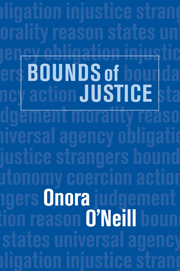Book contents
- Frontmatter
- Contents
- Preface
- Introduction
- Part I Philosophical Bounds of Justice
- Part II Political bounds of justice
- 7 Transnational economic justice
- 8 Justice, gender and international boundaries
- 9 Identities, boundaries and states
- 10 Distant strangers, moral standing and porous boundaries
- Bibliography
- Index
9 - Identities, boundaries and states
Published online by Cambridge University Press: 02 December 2009
- Frontmatter
- Contents
- Preface
- Introduction
- Part I Philosophical Bounds of Justice
- Part II Political bounds of justice
- 7 Transnational economic justice
- 8 Justice, gender and international boundaries
- 9 Identities, boundaries and states
- 10 Distant strangers, moral standing and porous boundaries
- Bibliography
- Index
Summary
BOUNDARIES IN POLITICAL PHILOSOPHY
Boundaries creep into political philosophy almost without our noticing. For example, within the liberal tradition of political discourse a theory of justice is often deployed to give some account of rights of universal scope – human rights – and of the corresponding limits of legitimate state powers. Yet before we know it we are talking about the justice not of a state but of states. As soon as we have states, we also, of course, have boundaries between states. The new arrivals are hardly noticeable until somebody raises a question about the just location of boundaries. At that point familiar discussions, such as those about self-determination and supposed rights to secession, may get going, without prior consideration of the nature or justice of boundaries. Yet it might be worth reflecting on the justice of boundaries before beginning these debates, and before asking which boundaries should exist.
Ostensibly boundaries are going to look problematic for all conceptions of justice – for example, liberal or socialist conceptions – which claim cosmopolitan scope. How can any form of moral cosmopolitanism be combined with a refusal of institutional cosmopolitanism? But it may seem at first sight as if boundaries are going to be unproblematic for those who in any case reject moral cosmopolitanism. Communitarians, relativists and other historicists look at politics and justice from some determinate location, from within and as legitimately limited by some set of boundaries. For example, Walzer takes it that political boundaries are the context of justice; MacIntyre takes it that cultural traditions are the context of all ethical categories and reasoning.
- Type
- Chapter
- Information
- Bounds of Justice , pp. 168 - 185Publisher: Cambridge University PressPrint publication year: 2000
- 1
- Cited by



